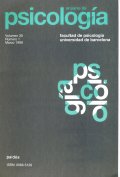Conceptualización y análisis psicológico del error humano en la conducción de vehículos a partir de los desarrollos recientes del modelo de habilidades, reglas y conocimientos
Keywords:
Skills, Rules and Knowledge model, task performance, human error, information processing, psychological factors and processes, automatic and controlled processing, driving task.Abstract
The Skills, Rules and Knowledge model (Rasmussen, 1987, 1986, 1983) is a theoretical-conceptual model that falls within the framework of information processing of cognitive psychology, and constitutes one of the principal models within which the performance of tasks that form part of complex activities such as driving motor vehicles have been researched both theoretically and empirically. Within this theoretical framework, driving behavior is explained in tems of cognitive information processing: the notions of cognitive control in the perfonnance of tasks and the distinction between automatic and controlled processing constitute the basis of this explanation. This explanation also includes the functioning of basic psychological factors and processes that underlie driving behavior: attention, complex leaming (perceptional, attentional, motor), experience, memory, perceptive-motorprocesses, etc. During the 90's along these same lines and within this theoretic framework, errors in human behavior that precede trafic accidents were studied. In this way, the theoretical-conceptual basis of this model -and the perspective of cogrtitive information processing in general- has guided the greater part of the theoretical and empirical research that is conducted in order to prevent human errors and accidents within the field of Trafic and Road Safety Psychology today. Based on recent developments related to the Skills, Rules and Knowledge model (Reason, 1994, 1990, 1987), a theory of considerable complexity has been elaborated which provides un explanation for the occurrence of human errors in driving (especially unintentional errors) and, to a large extent, sheds light on the functioning of some basic psychological factors and processes that underlie such errors. The objective of this paper is to study these psychological factors and processes, as well as to provide a conceptual analysis and an analysis of the categories of human error in driving that are included within this theoretical framework.Downloads
Published
1999-01-11
Issue
Section
Articles
License
The authors who publish in this journal agree to the following terms:
Authors transfer to the publisher all copyright for the full term of protection and for all the world.
The authors can post a copy of their articles in accordance with the policy of free access to the journal.


